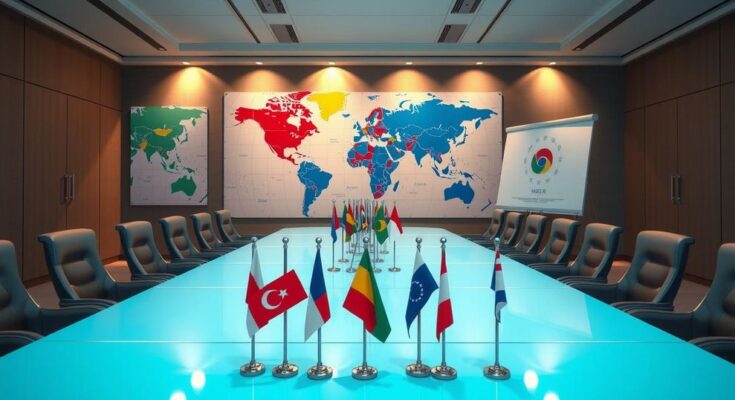This article discusses the pressing need for Nigeria to recalibrate its foreign policy in response to a rapidly changing global landscape. It emphasizes the importance of adapting to new realities in international relations and outlines key perspectives from renowned scholars on the necessity of prioritizing national interests, strategic autonomy, and regional leadership. The article also proposes five critical initiatives to strengthen Nigeria’s diplomatic engagements and ensure its relevance on the global stage.
The global landscape is undergoing rapid and irreversible transformations. The equilibrium established among nations is shifting towards a multipolar reality. In light of Nigeria’s aspirations and domestic challenges, there is an urgent need for a reevaluation of its foreign policy to adapt effectively to these new dynamics.
The Nigerian national security apparatus, including intelligence, military, and foreign services, must recognize the changing global milieu prompted by recent developments in the United States. The foundational principles guiding Nigeria’s international stance—historical alignment with the West and reliance on multilateralism—are increasingly inadequate. A pragmatic and forward-thinking foreign policy is now essential for national survival and prosperity.
Insights from esteemed international relations scholars—Bolaji Akinyemi, Francis Fukuyama, Samuel Huntington, John Mearsheimer, George Obiozor, and Jeffrey Sachs—illustrate a consensus: nations must swiftly adapt to thrive in an increasingly fragmented world order. The current global environment necessitates clarity and conviction in foreign policy approaches.
Fukuyama critiques the current regression of democracy and the crisis affecting liberal institutions, stressing Nigeria’s need to bolster its domestic governance to gain a respected position globally. Huntington’s perspective on identity politics suggests that Nigeria, with its diverse society, should base its foreign policy on cultural and regional awareness. Mearsheimer advocates for a realist approach, recommending that Nigeria cease seeking validation from Western nations and instead focus on its sovereign interests with strategic discipline.
Moreover, Sachs emphasizes the importance of integrating development, justice, and climate sustainability into Nigeria’s foreign policy. In light of existing global inequalities and climate challenges, it is critical for Nigeria to proactively engage in foreign policy focused on development, green initiatives, and digital diplomacy.
Professor Akinyemi urges Nigeria to exercise strategic autonomy through African agency. His belief in forming a coalition of emerging states aligns with the BRICS phenomenon, advocating for Nigeria’s non-alignment to foster global influence. Professor Obiozor highlights that without internal legitimacy, Nigeria’s foreign policy will be aspirational rather than practical. Their discourse suggests that without significant adaptation, Nigeria risks becoming directionless amid global changes.
Nigeria faces multifaceted challenges, including the U.S.-China rivalry, climate change implications, and increasing instability from regional conflicts. These factors threaten Nigeria’s trade, investment, and international aid access, while diminishing its regional voice in global governance.
Nevertheless, Nigeria has the potential to spearhead Africa’s diplomatic realignment. The country must adjust its foreign policy to prioritize sovereignty and strategic leadership and strengthen its diplomatic frameworks through the Economic Community of West African States (ECOWAS).
Five pivotal actions can facilitate this realignment: 1) Conduct a comprehensive review of national security and foreign policy; 2) Advocate for an African Union summit to articulate Africa’s stance on the global order; 3) Establish an active secretariat for the National Security and Defence Council with diverse ministerial representation; 4) Broaden Nigeria’s strategic alliances beyond traditional Western ties; and 5) Incorporate sustainability and innovation into its foreign engagements.
In conclusion, Nigeria stands at a crucial juncture for redefining its foreign policy strategy. Strengthening its foreign policy is vital for national security and global standing. Guided by the intellectual legacies of Akinyemi and Obiozor, alongside contemporary global insights, Nigeria must actively shape its international presence. A stagnant approach will result in a diminished capacity to influence global dynamics. By clarifying its interests and establishing regional cooperation, Nigeria can emerge strong amid a swiftly changing world.
In summary, it is imperative for Nigeria to reassess and recalibrate its foreign policy amid the evolving global landscape. This involves embracing a strategic approach that prioritizes national sovereignty, cultural sensitivity, and regional leadership. The proposed initiatives, along with the insights of esteemed scholars, underscore the importance of a coherent and proactive foreign policy to ensure Nigeria’s resilience and influence in a fragmented world order. A failure to act decisively poses significant risks to Nigeria’s future prospects.
Original Source: businessday.ng




